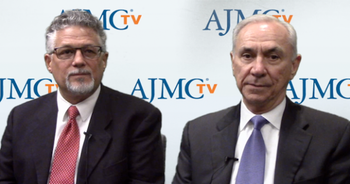
Employers
Latest News

Latest Videos

More News

Since they foot the bill for a lot of Americans’ healthcare costs, employers have a lot vested in the health of their populations and have been involved with pushing for healthcare transformation, said Suzanne Delbanco, PhD, MPH, executive director of Catalyst for Payment Reform.

The survey of more than 340 women revealed an overwhelming belief that people with migraine are dismissed as exaggerating their symptoms and that employers don't understand the burden of migraine on their employees.

New research from the Employee Benefit Research Institute has found that although there was some erosion in health insurance offered by employers after the implementation of the Affordable Care Act, the percentage of private-sector employers offering health benefits increased in 2017 for the first time since 2008.

In a survey of 170 employers, employers indicated that they are taking a more activist role in delivering healthcare to their employees, expressed frustration with the pharmaceutical supply chain, and said they expect to see a large uptake of virtual healthcare in the coming years.

A new study from the Healthcare Financial Management Association, Leavitt Partners, and McManis Consulting found that the penetration of value-based payment (VBP) models is not yet enough to generate cost savings and is also not affecting clinical quality outcomes at the market level.

The ability to have a plan that’s going to work and be large enough that it makes sense for those involved is a barrier for employers who want to pursue alternative payment models, said David Merrill, HR benefits manager, Volusia County, Florida, and John Robinson, CEBS, REBC, RHU, president and CEO, RobinsonBush.

Scaling back the Comprehensive Care for Joint Replacement model and canceling an expansion proposed under the Obama administration represents a shift in philosophy from mandatory to voluntary bundled payment models. But some say that commercial payers and employers will demand change no matter what CMS does.

The Gallup-Sharecare Wellbeing Index released its estimate of the cost of diabetes for employers on World Diabetes Day.

Brian Marcotte, president and CEO of the National Business Group on Health, offers recommendations for employers that are considering accountable care organizations (ACOs) and describes situations when an ACO is not a good fit.

"Voluntary" is the key word in today's wellness programs, after EEOC rules were tested in court.

After great effort to resolve apparent conflicts between the ACA and older statutes, including the Americans with Disabilities Act, a repeal of the healthcare law may send regulators back to the drawing board.

At the Payer Exchange Summit V, sponsored by the Community Oncology Alliance (COA), 2 employer groups and a provider participated on a panel to provide practical insight into the extraordinary challenges and decisions faced by employers and employees with a cancer diagnosis.

Also, the share of employers funding wellness programs has passed the 50% mark, but not all employees use them.

More employers are requiring prior authorization and the use of select specialty pharmacies for high-cost drugs.

The Pregnancy Discrimination Act of 1978 prevents questions about status from being asked, and does not require a woman to disclose her pregnancy in an interview.

Incentives in employee wellness programs, especially penalties, can hurt morale and lead to legal action. But without incentives, there's no guarantee the employer will see healthcare savings and return on investment.


Employers and employees are seeing eye-to-eye when it comes to integrated health benefits. Not only do employees see how an integrated plan can improve quality of care and health, but employers see how it makes good business sense.

The accountable care organization, or ACO, can be a mechanism for employers to achieve healthcare savings, according to a just-published article in The American Journal of Accountable Care, the publication of The American Journal of Managed Care dedicated to healthcare reform.

Retail health insurance marketplaces, also known as exchanges, are on the cusp of dramatically changing the health insurance business, according to a new report from PwC's Health Research Institute.

Can a diabetic's likelihood of developing complications depend on picking the right doctor? A study suggests it can.

MedImpact, a leading pharmacy benefit manager, will contribute the "Drug Trends" column for AJPB.

The American Journal of Pharmacy Benefits (AJPB) and the Pharmacy Benefit Management Institute (PBMI) today unveiled a strategic partnership between the two organizations, which will provide professionals in the pharmacy benefit management industry with free access to both AJPB and its flagship publication, The American Journal of Managed Care (AJMC).












